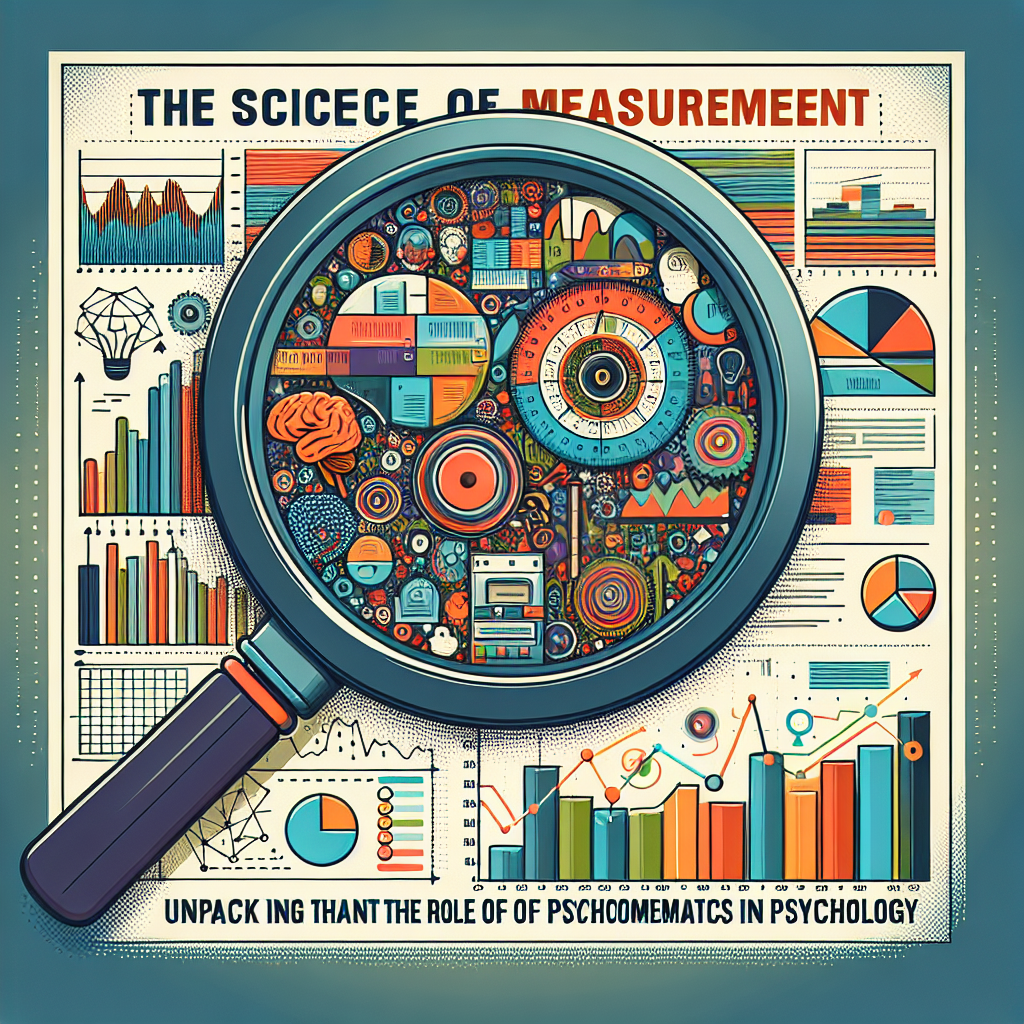
Introduction
In a world inundated with data, the importance of measurement becomes increasingly essential, especially within the realm of psychology. The Science of Measurement: Unpacking the Role of Psychometrics in Psychology is a vital concept that guides researchers and practitioners alike. How we measure psychological traits, behaviors, and perceptions shapes not only research findings but also therapeutic practices and policies. This article aims to delve deep into psychometrics, unraveling its methodologies, applications, and significant impact on psychology.
The Foundations of Psychometrics
What is Psychometrics?
Psychometrics is the field dedicated to the theory and technique of psychological measurement. This includes the measurement of knowledge, abilities, attitudes, and personality traits through standardized tests and assessments. The goal of psychometrics is to ensure that these measurements are both valid—measuring what they are supposed to measure—and reliable—yielding consistent results over time.
Historical Context
The roots of psychometrics date back to the early 20th century. Pioneers like Alfred Binet and Lewis Terman developed intelligence testing methods, setting the stage for modern psychological assessments. Over the decades, advancements in statistics and empiricism have refined these initial efforts, leading to a rigorous scientific approach to measurement in psychology.
The Science of Measurement: Unpacking Key Concepts
Types of Measurement
Quantitative Measurement: This involves numerical data that can be statistically analyzed. Psychometric tests often yield scores that provide a basis for comparing individuals.
- Qualitative Measurement: This encompasses non-numerical data, offering richer insights through interviews and open-ended questions. While more subjective, qualitative approaches can complement quantitative methods by providing context.
Validity and Reliability
Valid psychometric testing lies in two core characteristics: validity and reliability.
Validity ensures that the test measures what it claims to measure. For example, an anxiety scale should accurately reflect anxiety levels, not mood or stress.
- Reliability refers to the consistency of the measurement. A reliable test yields the same results under consistent conditions.
Case Study: The MMPI
The Minnesota Multiphasic Personality Inventory (MMPI) illustrates the importance of validity and reliability. Originally developed in the late 1930s, this assessment tool has undergone extensive validation to become one of the most widely used personality assessments worldwide. Its enduring relevance underscores the impact of robust psychometric principles in psychology.
Tools and Techniques
The tools of psychometrics range from self-report questionnaires to behavioral assessments.
Questionnaires
Self-report questionnaires are ubiquitous in psychometrics. Examples include the Beck Depression Inventory and the Big Five Personality Inventory. These tools allow individuals to provide insights into their thoughts, feelings, and behaviors.
Behavioral Assessments
Behavioral assessments involve observing participants in controlled settings or naturalistic environments. For example, a study may involve analyzing social interactions to assess anxiety levels, offering a qualitative counterpart to reliance on self-reports.
Statistical Foundations
Psychometrics relies on a blend of classical and modern measurement theories.
Classical Test Theory (CTT): This foundational approach assumes that each test score consists of a true score and an error score. CTT focuses on reliability and validity from a statistical perspective.
- Item Response Theory (IRT): A more complex methodology, IRT examines the relationship between individual test items and a person’s latent traits. This approach allows for the development of adaptive testing techniques, improving measurement accuracy.
Table: Comparison of CTT and IRT
| Feature | Classical Test Theory (CTT) | Item Response Theory (IRT) |
|---|---|---|
| Focus | Total score reliability | Item-level information |
| Assumptions | Linear relationship | Non-linear relationship |
| Applications | Traditional tests | Tailored testing |
Practical Applications of Psychometrics
Psychometrics informs numerous aspects within psychology, including clinical assessment, educational evaluation, and organizational psychology.
Clinical Psychological Assessment
In clinical settings, psychometric tests are instrumental in diagnosing mental health disorders. The accurate assessment of conditions like depression and anxiety can significantly affect treatment strategies.
Case Study: Beck Depression Inventory
The Beck Depression Inventory (BDI), a self-report questionnaire, exemplifies how psychometric principles are applied in real-life settings. Its high reliability and validity have made it a staple in both research and clinical practice.
Educational Measurement
In education, psychometrics plays a crucial role in standardized testing. Assessments are designed with psychometric properties in mind to accurately gauge student performance and potential.
Case Study: SAT and ACT
The SAT and ACT are standardized assessments used in college admissions. Developed with extensive research into psychometric principles, these tests aim to provide valid measures of students’ readiness for higher education.
Organizational Psychology
In organizational contexts, psychometrics is utilized for employee selection, training, and development. Assessments help identify candidates whose personality traits align with organizational culture, improving employee satisfaction and retention.
Case Study: Personality Testing in Hiring
Organizations increasingly use personality assessments, such as the Myers-Briggs Type Indicator (MBTI), during the hiring process. By examining the match between candidate profiles and job requirements, companies can enhance team dynamics and productivity.
Challenges in Psychometrics
Despite its significance, psychometrics faces challenges, including cultural biases, ethical considerations, and advances in technology.
Cultural Biases
Psychometric tests can reflect cultural biases that may affect their validity across diverse populations. Tests developed in one cultural context may not be applicable or equitable in another. It is crucial for researchers to consider cultural factors when interpreting results.
Ethical Considerations
The ethical implications of psychometric assessments must be considered, particularly concerning informed consent and the potential for misuse of test results. Practitioners must uphold ethical standards to ensure fair treatment of individuals being assessed.
The Future of Psychometrics
As technology evolves, so does psychometrics. The rise of artificial intelligence and machine learning presents new opportunities for data analysis, potentially enhancing the precision and scope of psychological measurements.
Advancements in Technology
Innovative technologies, such as online assessments and real-time data collection, offer unprecedented access to psychometric evaluations. These tools can foster deeper insights into human behavior and inform interventions tailored to individual needs.
Conclusion
The Science of Measurement: Unpacking the Role of Psychometrics in Psychology underscores the essential functions that psychometrics serve in understanding human behavior. Accurate measurements are vital for diagnosing psychological conditions, evaluating educational performance, and enhancing workplace dynamics. As we continue to advance technologically, the field of psychometrics will no doubt evolve, offering even more sophisticated tools and insights for both practitioners and researchers.
FAQs
What is the primary purpose of psychometrics?
Psychometrics aims to measure psychological traits, behaviors, and perceptions with accuracy and reliability.How do validity and reliability differ?
Validity concerns whether the test measures what it’s intended to measure, while reliability focuses on the consistency of the results.What is Item Response Theory (IRT)?
IRT is a modern statistical approach that examines the relationship between individuals and their responses to specific test items.How are psychometric tests used in clinical psychology?
They are used for diagnosing mental health disorders, guiding treatment decisions, and tracking patient progress.- What are some challenges faced in psychometrics?
Challenges include cultural biases in tests, ethical considerations regarding the use of assessments, and the rapid evolution of technology.
By comprehending The Science of Measurement: Unpacking the Role of Psychometrics in Psychology, we empower ourselves to embrace the tools that drive psychological understanding and foster improvement across various domains of life.















